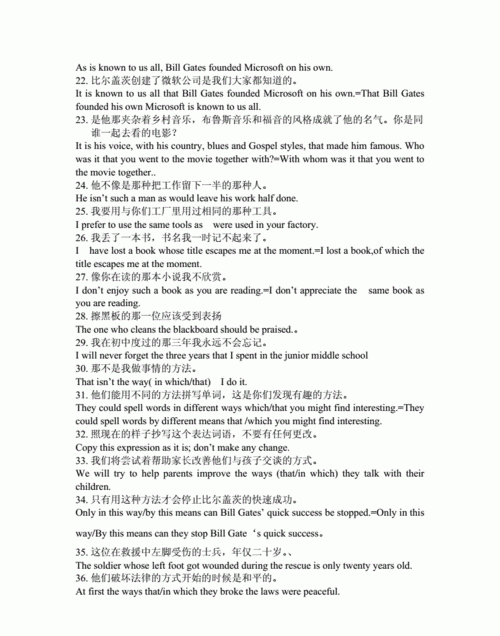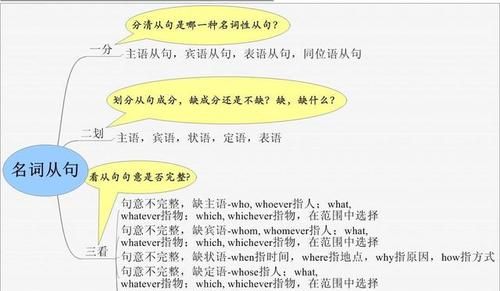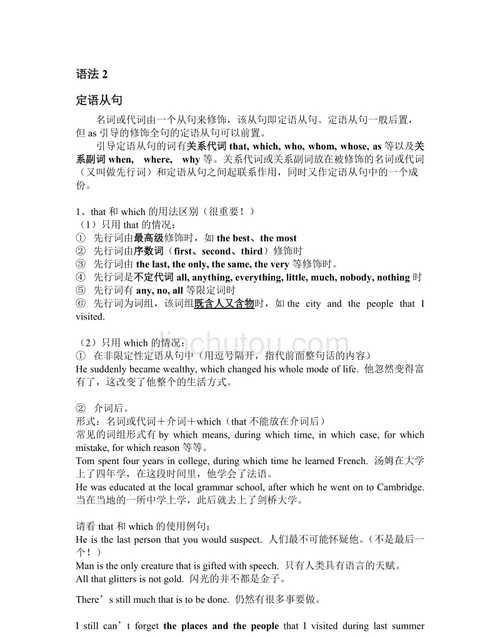本文目录
限制性定语从句例句
名词性定语从句例句 1
一.主语从句
1、Who was responsible for the accident is not yet clear.
2、Why he left so abruptly is not known to any of us.
3、When he’ll be back depends much on the weather.
4、Whether she comes or not doesn’t concern me.
5、Wherever he once lived is well preserved.
6、It is natural that they should have different views.
7、It was quite plain that she didn’t want come.
8、It’s a pity that he can’t swim.
9、It was a fearful disappointment to your mother that you didn’t come yesterday.
10、It happened that she wasn’t in that day.
11、It struck me that we ought to make a new plan.
12、It was rumored that he was suffering from a tone in the kidney.
13、It is estimated that 25 million school lunches are sold each day.
14、Where I spend my summer is none of your business .
15、It’s doubtful whether the payment is legal.
16、It was a question whether he should get married.
17、What the professor said is of great importance.
18、Whoever break the rules will be punished.
19、Who killed the scientist remains a question.
20、It doesn’t matter whether she will come or not.
二.宾语从句
1、 We never doubt that he is honest.
2、 I can’t imagine what made him act like that.
3、 Nobody can tell when she will arrive.
4、 Before I came downstairs I had prepared myself very carefully for what I must say.
5、 You must give it back to whoever it belongs to.
6、 I’ve heard that you’ve won a scholarship.
7、 I feel it a terrible thing that my mother should have to toil so endlessly.
8、 We are talking about whether we admit students into our club.
9、 He told me that he was preparing for the English test.
10、Our teacher told us that light travels much faster than sound.
11、Can you tell me how I can get to the zoo?
12、The doctor insists that I give up smoking.
13、She remember nothing about him except that his hair is black.
14、I suggest that they shouldn’t drive along the coast.
15、Have you found out how wide the ditch was?
16、Tomorrow at this time we will know who is elected?
17、Everybody knows that money doesn’t grow on tree.
18、The villager didn’t realize how serious the pollution was until the fish in the river died.
19、She said that she would come to the meeting.
20、The book will tell you what the best CEO should do.
三.表语从句
1、The fact is that he didn’t notice the car until too late.
2、The mystery is whether he ever went there at all.
3、The question is why he likes the place so much.
4、The problem is not who will go but who will stay.
5、Your brother’s health is not what it used to be.
6、The question is whether they will b able to help us.
7、His suggestions is that we should stay calm.
8、It sounds as if someone is knocking at the door.
9、He looked just as he had looked ten years ago.
10、That is because he didn’t understand me.
11、That is why he got angry with me.
12、The problem is who we can get to replace her.
13、The trouble is that I lost her address.
14、The questions is whether we can rely on him.
15、That is because we are in need of money at that time.
16、He looked as if he was going to cry.
17、The reason why he has to go is the his mother is ill in bed.
18、The questions is whether it is worth doing.
19、The mountain is no longer what is used to be.
20、The questions is what caused the accident.
四.同位语从句
1、They had to face the fact that the nea
rest filling station is 30 miles away.
2、Have you any idea how soon they are coming?
3、Obviously there was little probability that they would succeed, but they didn’t mind.
4、The suggestion that the new rule be adopted came from the chairman.
5、There is a feeling in me that it is going to rain.
6、The proposal has been put forward that the flight should be cancelled.
7、The government gave an order that all the house should be pulled down in three weeks.
8、We haven’t settled down the question where we are going to spend our summer vocation.
9、There is no doubt that he will keep his promise.
10、Many British parents hold the view that teenagers shouldn’t spend too much time online.
11、The thought that they could cross the whole continent was exciting.
12、I’ve come to the conclusion that it was unwise to do that.
13、They expressed the wish that she accept the award.
14、The question whether it is right or wrong depends on the result.
15、The rumor spread that a new school would be built here.
16、The questions who should do the work require consideration.
17、The suggestion that the new rule be adopted came from the chairman.
18、The news that oil price will go down is untrue.
19、The question why so many animals died suddenly in that area remains unsettled.
20、We have no scientific proof for the idea that time travel is impossible.
名词性定语从句例句 2
that常用作关系代词,可指代某人,也可指代某物,指物时有的时候可用which替换that,指人时可用who替换。但在下列情况下,一般用that。
一、that指代某物事时
1.先行词为all, few, little, much, the one, something, anything, everything, nothing等时。如:
(1)We'll do all that we can to protect the endangered plants and animals.
我们将尽我们的最大努力来保护那些濒危的动植物。
(2) There is much that I wan to tell you.
我有很多想要告诉你的话。
(3) Is there anything that I can do for you?
有什么我可以帮你的吗?
2. 先行词被all, every, no, some, any, (a)few, (a)little, much等限定词修饰时。如:
(4) You can borrow any book that you want to read in our school library.
在我们图书馆,你可以借任何你想读的书。
3. 先行词被序数词或形容词最高级修饰时。如:
(5)This is the most beautiful city that I've ever seen.
这是我见过的最漂亮的城市。
4. 先行词被the only, the very, the right, the last 等修饰时。如:
(6)This is the very factory that they visited last summer holiday.
这恰好是他们去年参观的那个工厂。
(7)This is the only painting in this style that we have.
这种风格的画我们仅有一幅。
5. 先行词是并列结构,既有人又有物时。如:
(8)He talked happily of the writer and his books that interested him.
6. 先行词前有the same 修饰,表示和先行词是同一物时。如:
(9)This is the same purse that I lost yesterday.
这就是我昨天丢的那个钱夹。
注:如果表示的是与先行词同一类或相似的某物,则用the same…as….如:
(10)This is the same purse as I lost yesterday.
这个钱夹和我昨天丢的那个一样。
7. 先行词为数词时。
(11)Look at the books on the bookshelf. You can see the two that you bought me for my birthday.
瞧书架上那些书。你可以看到我过生日时你买的那两本。
8. 如果which引导的定语从句中又含有一个定语从句,为避免重复,第二个定语从句用that。如:
(12)They built a factory which produced things that had never been seen.
他们建了一工厂,生产以前从未见过的东西。
9. 以which作主语开头的特殊问句,为了避免重复,定语从句用that。如。
(13)Which is the bus that you will take?
你要乘的是哪一班车?
10. 关系代词在定语从句中作表语时,而且通常省略。如:
(14)My hometown is no longer the place that it used to be.
我的`家乡再也不是以前那个样子了。
11. 关系代词在there be 句型中作主语时,而且常可以省略。如:
(15)This is the fastest train (that) there has ever been.
这是有史以来最快的列车。
二、that 指代某人时。
1. 泛指某人时。如:
(16)He is a man that is never at a loss.
他是一个从未一筹莫展的人。
2. 主句是以作主语的who开头的特殊问句,为了避免重复时。如:
(17)Who is the person that is talking with our headmaster?
和我们校长说话的那人是谁?
3. 先行词前有the same时。如:
(18)This is the same man that gave us a talk last year.
这和去年给我们作报告的是同一人。
4. 关系代词在定语从句中作表语时。如:
(19)He has changed. He was not the man (that) he was 10 years ago.
他变了。他再也不是10年前的他了。
另外,that也可用作关系副词,表示时间、地点、原因和方式,在口语中可以用来代替when, where, why 引导的定语从句。在以下名词day, year, time, moment, reason, place等作先行词时,可用that作关系副词引导定语从句。如:
(20)I'll never forget the day (that) I joined the League.
我永远不会忘记我入团的那一天。
(21)Is this the reason (that) they were late for the meeting?
这就是他们开会迟到的原因吗?
(22)We want to find a place (that) we can have a picnic.
我们想找一个我们能野餐的地方。
(23)This is the first time that I have been abroad for traveling.
这是我第一次到国外去旅游。
(注:先行词是time,前面有序数词或last修饰时,常用that引导定语从句或者省略。)
当先行词为表示方式的词the way时,可用that引导定语从句, that常可以省略。
(24)I don't the way you speak to her.
我不喜欢你和她说话那种方式。

动名词作后置定语的例句
动名词作定语例句如下:
1.The sleeping car that he bought last week is very expensive.
sleeping是动名词,修饰名词car.
2.The swimming pool being built is very large.
swimming是动名词,修饰名词pool.

3. He may be in the reading room. 他可能在阅览室里。
4.They set up an operating table. 他们搭起一个手术台。
5.The singing birds brought us much joy. (现在分词singing作定语)鸣唱着的小鸟给我们带来很多欢乐 。

6. I would like to choose a house with a swimming pool.我想选个带游泳池的房子。
动名词作定语,说明被修饰词的性质、特征或用途。
动名词作定语,表示其与被修饰词之间为主动关系。
给我举个名词性定语的例子英语
apple juice
apple 是名词, 在这里做定语

汉语中名词做主语例句
1.The book is new.主语
2.Books can act as our friends.主语
3.Do you like English?动宾
4.There is a book on thedesk.介宾
5.He is a student.表语
6.It sounds a good idea.表语
7.He lives in a stone house.定语
8.He is waiting at the bus stop.定语
9.Our head teacher,Mr.Smith,is coming.同位语
10.Tom,my best friend,was praised this morning.同位语

以上就是关于名词定语句举例 ,限制性定语从句例句的全部内容,以及名词定语句举例 的相关内容,希望能够帮到您。
